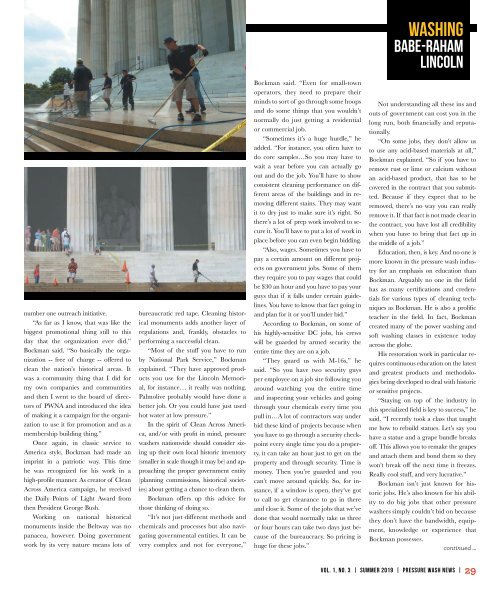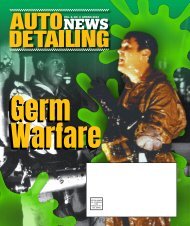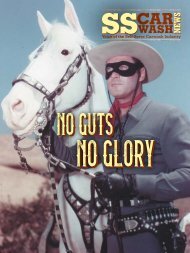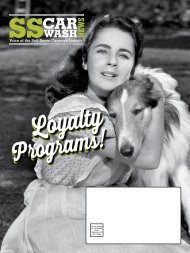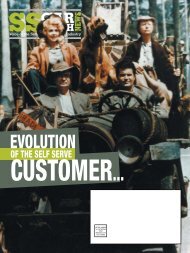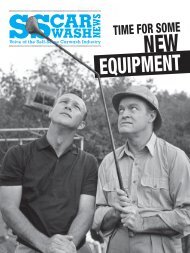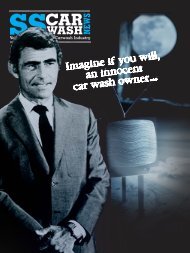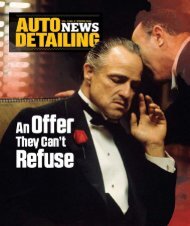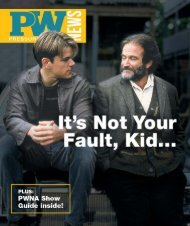Summer 2019
You also want an ePaper? Increase the reach of your titles
YUMPU automatically turns print PDFs into web optimized ePapers that Google loves.
WASHING<br />
BABE-RAHAM<br />
LINCOLN<br />
number one outreach initiative.<br />
“As far as I know, that was like the<br />
biggest promotional thing still to this<br />
day that the organization ever did,”<br />
Bockman said. “So basically the organization<br />
-- free of charge -- offered to<br />
clean the nation’s historical areas. It<br />
was a community thing that I did for<br />
my own companies and communities<br />
and then I went to the board of directors<br />
of PWNA and introduced the idea<br />
of making it a campaign for the organization<br />
to use it for promotion and as a<br />
membership building thing.”<br />
Once again, in classic service to<br />
America style, Bockman had made an<br />
imprint in a patriotic way. This time<br />
he was recognized for his work in a<br />
high-profile manner. As creator of Clean<br />
Across America campaign, he received<br />
the Daily Points of Light Award from<br />
then President George Bush.<br />
Working on national historical<br />
monuments inside the Beltway was no<br />
panacea, however. Doing government<br />
work by its very nature means lots of<br />
bureaucratic red tape. Cleaning historical<br />
monuments adds another layer of<br />
regulations and, frankly, obstacles to<br />
performing a successful clean.<br />
“Most of the stuff you have to run<br />
by National Park Service,” Bockman<br />
explained. “They have approved products<br />
you use for the Lincoln Memorial,<br />
for instance… it really was nothing.<br />
Palmolive probably would have done a<br />
better job. Or you could have just used<br />
hot water at low pressure.”<br />
In the spirit of Clean Across America,<br />
and/or with profit in mind, pressure<br />
washers nationwide should consider sizing<br />
up their own local historic inventory<br />
(smaller in scale though it may be) and approaching<br />
the proper government entity<br />
(planning commissions, historical societies)<br />
about getting a chance to clean them.<br />
Bockman offers up this advice for<br />
those thinking of doing so.<br />
“It’s not just different methods and<br />
chemicals and processes but also navigating<br />
governmental entities. It can be<br />
very complex and not for everyone,”<br />
Bockman said. “Even for small-town<br />
operators, they need to prepare their<br />
minds to sort of go through some hoops<br />
and do some things that you wouldn’t<br />
normally do just getting a residential<br />
or commercial job.<br />
“Sometimes it’s a huge hurdle,” he<br />
added. “For instance, you often have to<br />
do core samples…So you may have to<br />
wait a year before you can actually go<br />
out and do the job. You’ll have to show<br />
consistent cleaning performance on different<br />
areas of the buildings and in removing<br />
different stains. They may want<br />
it to dry just to make sure it’s right. So<br />
there’s a lot of prep work involved to secure<br />
it. You’ll have to put a lot of work in<br />
place before you can even begin bidding.<br />
“Also, wages. Sometimes you have to<br />
pay a certain amount on different projects<br />
on government jobs. Some of them<br />
they require you to pay wages that could<br />
be $30 an hour and you have to pay your<br />
guys that if it falls under certain guidelines.<br />
You have to know that fact going in<br />
and plan for it or you’ll under bid.”<br />
According to Bockman, on some of<br />
his highly-sensitive DC jobs, his crews<br />
will be guarded by armed security the<br />
entire time they are on a job.<br />
“They guard us with M-16s,” he<br />
said. “So you have two security guys<br />
per employee on a job site following you<br />
around watching you the entire time<br />
and inspecting your vehicles and going<br />
through your chemicals every time you<br />
pull in…A lot of contractors way under<br />
bid these kind of projects because when<br />
you have to go through a security checkpoint<br />
every single time you do a property,<br />
it can take an hour just to get on the<br />
property and through security. Time is<br />
money. Then you’re guarded and you<br />
can’t move around quickly. So, for instance,<br />
if a window is open, they’ve got<br />
to call to get clearance to go in there<br />
and close it. Some of the jobs that we’ve<br />
done that would normally take us three<br />
or four hours can take two days just because<br />
of the bureaucracy. So pricing is<br />
huge for these jobs.”<br />
Not understanding all these ins and<br />
outs of government can cost you in the<br />
long run, both financially and reputationally.<br />
“On some jobs, they don’t allow us<br />
to use any acid-based materials at all,”<br />
Bockman explained. “So if you have to<br />
remove rust or lime or calcium without<br />
an acid-based product, that has to be<br />
covered in the contract that you submitted.<br />
Because if they expect that to be<br />
removed, there’s no way you can really<br />
remove it. If that fact is not made clear in<br />
the contract, you have lost all credibility<br />
when you have to bring that fact up in<br />
the middle of a job.”<br />
Education, then, is key. And no one is<br />
more known in the pressure wash industry<br />
for an emphasis on education than<br />
Bockman. Arguably no one in the field<br />
has as many certifications and credentials<br />
for various types of cleaning techniques<br />
as Bockman. He is also a prolific<br />
teacher in the field. In fact, Bockman<br />
created many of the power washing and<br />
soft washing classes in existence today<br />
across the globe.<br />
His restoration work in particular requires<br />
continuous education on the latest<br />
and greatest products and methodologies<br />
being developed to deal with historic<br />
or sensitive projects.<br />
“Staying on top of the industry in<br />
this specialized field is key to success,” he<br />
said. “I recently took a class that taught<br />
me how to rebuild statues. Let’s say you<br />
have a statue and a grape bundle breaks<br />
off. This allows you to remake the grapes<br />
and attach them and bond them so they<br />
won’t break off the next time it freezes.<br />
Really cool stuff, and very lucrative.”<br />
Bockman isn’t just known for historic<br />
jobs. He’s also known for his ability<br />
to do big jobs that other pressure<br />
washers simply couldn’t bid on because<br />
they don’t have the bandwidth, equipment,<br />
knowledge or experience that<br />
Bockman possesses.<br />
continued ...<br />
VOL. 1, NO. 3 | SUMMER <strong>2019</strong> | PRESSURE WASH NEWS | 29


